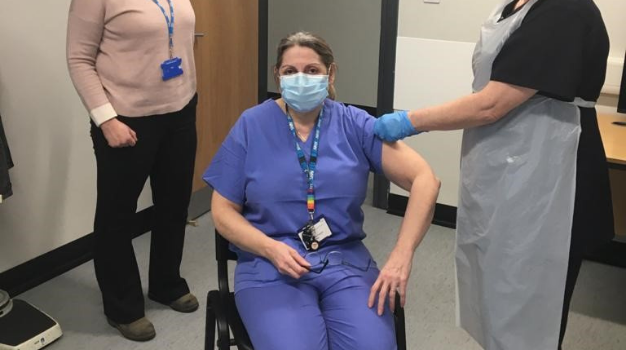How the NHS has shaped the person that I am - Fiona Taylor on 40 years of NHS service
Monday, February 14, 2022

Fiona Taylor joined the NHS as a student nurse and has spent 40 years in the service. She is currently chief officer at NHS South Sefton Clinical Commissioning Group (CCG) and NHS Southport and Formby CCG, having risen through the organisation on a mission to improve the lives of patients and staff. She shares her memories of a meaningful career, the experiences that transformed her from an eager teenager to an impactful leader, and why she prescribes a life of public service for those looking to make a difference with their work.
It was 1982 when I first set foot in the Salford School of Nursing. I was a 17 year old nurse in training, almost the youngest in my class, and surrounded by my fellow students in their perms and shoulder pads I was about to embark on the first chapter of what became a lifelong career within our national health service.
Of course, the training was quite different back then. We didn’t study a degree at university like nurses do today, we began with just six weeks in a classroom environment to learn the basics, before being deployed to placements on hospital wards. I spent eight weeks at a time on placements, developing my practical skills before taking a block of exams and assessments to test my competencies. This hybrid model of learning was a really positive experience for me, helping cultivate a deeply caring and compassionate nature that is so important to a healthcare role.
I think nurses today would hardly recognise the uniforms we wore back then either! The elasticated frilly cuffs, wide belts and Peter Pan collars have all evolved over the years, but I do remember wearing the now-obsolete white nursing cap as proudly as if it were a crown. I found real satisfaction and passion in my work and gave it my all.
A seat at the table
Fast forward a few years and I expanded my nursing skills to become a midwife and later a health visitor. During those years working hands on with patients, I stepped into countless people’s lives at their greatest hour of need, sharing their most vulnerable and intimate moments and experiencing the highs and lows right alongside them. It was very humbling and ignited in me a desire to be a driver of positive change for our patients.
I wanted more ability to influence how our service was run, to effect change to a much greater extent than I was able to at the coalface of patient care. Call it the ‘arrogance’ of a 27 year old if you will but I thought I could do things better, so after 10 years in clinical roles I went into management. Luckily for anyone with ambition like I had, the NHS is an organisation full of varied roles and opportunities to progress and make a difference, not just in medical care but in finance, governance, communications, you name it - it takes a village.
I spent 12 months as deputy director of nursing and then acting director of nursing at Mancunian Community Health Trust, where I really wanted to make sure the voices of nurses were heard, to understand from their perspective how we could improve patient care.
In 2012, after taking on numerous other operational, commissioning director and acting chief executive roles I was appointed as chief officer of the CCGs in Sefton, where I still strive to ensure that our nursing staff are given a seat at the table. We were the first CCG to invite student nurses in for placements, which I hope helps build good working relationships and gives some insight into commissioning and how this relates to their work out on the wards and in community settings.
In my experience strong, positive relationships with our staff are really important for making sure everybody feels heard and valued, and I have found some fantastic role models and relationships with my own managers over the years. This is the kind of workplace where we are stronger together, and everyone’s opinion is important so it presents an opportunity to really make an impact with your work if that’s what you desire. I have an open door policy to encourage everyone and anyone to come and talk or feed back, with no hidden agenda - integrity is very important to me.
40 years of changes and challenges
As much as my role in the NHS has changed, so has the organisation as a whole. Many restructures and changes have taken place as regulations are revised and technologies and medicines advance, but the intent is always to improve patient care.
I would say the biggest change is that the NHS has become much more of a national health service than a ‘sickness service’ – by which I mean that there is much more of a proactive focus on the health and wellbeing of the population, as well as being there to treat illness and injuries. There is much greater focus now on things like mental health services, reducing teenage pregnancy rates - which have decreased significantly in Sefton, and a commitment to reducing health inequalities between the most and least affluent areas across the country.
There has also been a lot of hard work along the way. My current role as chief officer has certainly been the most challenging I’ve experienced so far, not least because of the past two years of added strain on all of our staff during the COVID-19 pandemic. A huge number of patients in our locality have needed a variety of care, while we have simultaneously rolled out the largest vaccination programme in history across which is no mean feat.
Service with a smile
That’s not to say we don’t have fun along the road. I’ve known hundreds of hard working team members over the years who face every challenge with a smile on their face and there are times that patients and staff alike have laughed our socks off together when things aren’t going our way.
One comical moment at Bradford City Teaching Primary Care Trust sticks in my mind. We had a minibus booked to transport a group of inspectors around various sites, but unbeknown to us the bus was over the height restriction limits for the car park barrier at Joseph Brennan House. As we drove through, the barrier peeled away the top of the minibus like it was opening a can of spam! What a great impression we must have given to the inspectors that day.
Motoring scrapes aside, I do truly believe that a sense of humour is essential in our line of work because we’re not machines, we’re all human beings with a personality, a family, a pet cat. Humour gets us through challenging times but it is also part of how we show kindness and compassion, how we connect with others and how we help to make patients feel good again. Even in end of life care there is a humility and tenderness in humour that can really help both patients and staff through some dark days.
It is not the destination, but the journey
So why have I been here for so long? I guess you could say that I was brought up into public service - I was quite poorly as a child and spent a lot of time in healthcare settings so I always felt like I’d like to give back. I joined the St John Ambulance Cadets when I was young, getting very involved in social action and health and wellbeing from the outset, but was also influenced by my mum, who had always wanted to be a nurse but never got the opportunity. In a way her dream has been lived out through me, so I hope I’ve made her proud.
I feel that whatever your vocation, this is a place where your work can have real meaning and somewhere you can grow. I’ve always felt that I got out of it more than I put in, and I would highly recommend it to anyone starting out on their career journey or looking for a change.
In truth, I’ve not known anything else. This has been my whole life, my only life. I’ve not done anything else since I was 17, so the NHS has really truly shaped the human being that I am.
It has taught me compassion, humility, how to build strong relationships, to always fight to do better for our community and how to smile (or laugh!) in the face of adversity. Most importantly it has taught me to never settle for less than my best, and what more can we ask of ourselves and our colleagues?
Looking back on 40 years of service, I am very grateful for the experiences I’ve been given and I would not hesitate to do it all again. It is a privilege to be a part of our national healthcare service and to share the responsibility of caring for people in our communities.
The NHS is an institution that is not always perfect but it is the envy of the world and one to be cherished.
If you are considering a career in the NHS, or would like to find resources on career planning, you can find out more about the variety of roles, opportunities and training available at: https://www.healthcareers.nhs.uk/we-are-nhs/we-are-nhs





